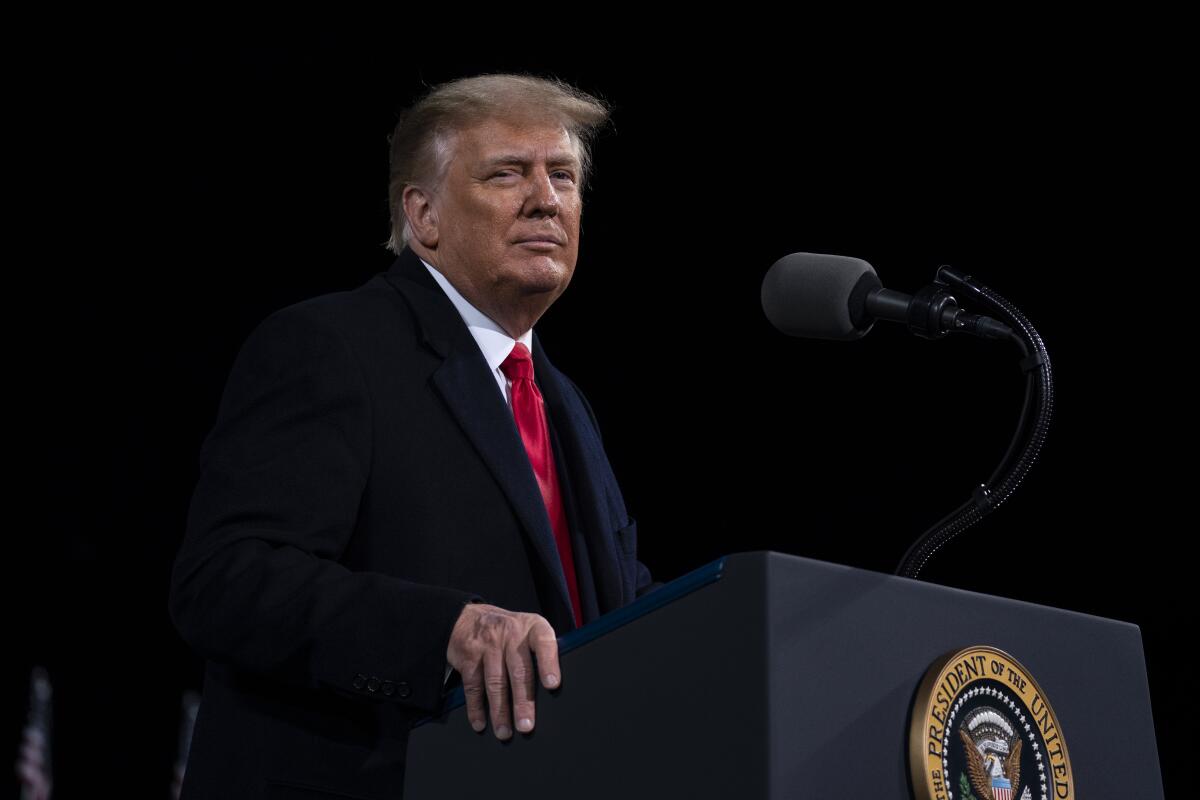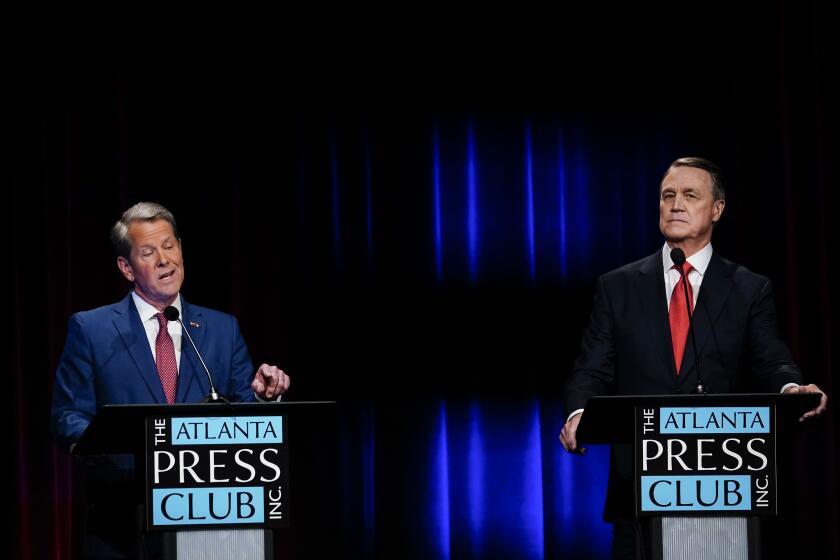Newsletter: Essential Politics: Is Trump still the GOP kingmaker?

- Share via
ATLANTA — After supporters of President Trump disrupted lawmakers as they certified the 2020 election results, I wondered what the moment might mean for the future of the Republican Party.
It was no surprise to see Democratic lawmakers swiftly decrying the insurrection. But it was jarring to see many Republicans follow suit, distancing themselves from Trump and his election lies. At least in the beginning.
It seemed that for a time, Trump may face stiff consequences and that his iron grip over his party had begun to wane. Two years later, it’s clear there’s no clear answer.
In a slew of primary elections around the country, Trump is still his party’s kingmaker, though not in the same way he was during the 2018 midterm elections. What does this mean for Trump and the future of his party? Does Trump still wield the same power he did during the 2018 midterm elections?
Hello besties, I’m Erin B. Logan, a reporter with the L.A. Times. I cover the Biden-Harris administration. This week, we are going to talk about the power of Trump’s endorsement.
Get our L.A. Times Politics newsletter
The latest news, analysis and insights from our politics team.
You may occasionally receive promotional content from the Los Angeles Times.
Trump’s endorsement record
After the Jan. 6 insurrection, Trump faded into relative obscurity — at least for him. But it didn’t take long for him to flex his muscles to remind his party of his power. Trump has given a slate of endorsements to candidates who echo his false claim that President Biden stole the 2020 election.
In Ohio, J.D. Vance’s Senate bid served as the first major test of Trump’s endorsement. Though the author of “Hillbilly Elegy: A Memoir of a Family and Culture in Crisis” was at first a critic of the former president, he won Trump’s endorsement after backing the false election claims. It appears to have played a major role in his winning the state’s primary, and with Ohio tilting more and more toward the GOP, he now has a strong a shot at the Senate in the general election.
The trend replicated itself with other candidates, including Max Miller of Ohio and Indiana Rep. Greg Pence, according to a midterm guide created by my colleagues Terry Castleman and Melanie Mason. Their analysis shows that the lion’s share of Trump’s endorsements have thus far been successful in their elections.
But Georgia and other races show that Trump’s endorsement is not the golden ticket it was during the 2018 midterm elections.
Two top incumbent Georgia Republicans — Gov. Brian Kemp and Secretary of State Brad Raffensperger — defied Trump’s demands to help overturn their state’s election results in his favor. He has maintained a grudge against the pair.
In Georgia primary, Republican Gov. Brian Kemp easily defeats Trump-backed former Sen. David Perdue and will face Stacey Abrams. A key Trump rival, Secretary of State Brad Raffensperger, avoids runoff.
Trump personally encouraged former Sen. David Perdue to run against the governor and endorsed Rep. Jody Hice to run against the secretary of state. Trump’s PAC has given $3 million to groups running ads against Kemp. Despite his best efforts, both Kemp and Raffensperger fended off their Trump-backed challengers and will face Democrats in the general election.
It’s not just in Georgia. Some of Trump’s picks elsewhere aren’t winning. In North Carolina, Madison Cawthorn conceded his race after a slew of personal blunders and an antagonistic relationship with Republican leaders. In Idaho, Lt. Gov. Janice McGeachin failed to best the incumbent Republican governor for another term. In the Alabama Senate race, Rep. Mo Brooks is headed to a runoff after winning (then losing) Trump’s endorsement. And in Pennsylvania, Trump’s Senate pick, Mehmet Oz still has not secured a slot in the general election. As of Tuesday afternoon, Oz was leading David McCormick by fewer than 1,000 votes.
Former President Trump uses primary endorsements to seek revenge, push election fraud lies and shape the Republican Party. How are his candidates faring?
The power of the endorsement
So, is Trump still his party’s kingmaker? Political analysts say yes, but not in a decisive way.
While it’s still early in election season, J. Miles Coleman, a political analyst at the University of Virginia’s Center for Politics, said it’s pretty clear that Republicans are less likely to fail with Trump’s blessing. “If I’m a Republican running for office, I would rather have Trump’s endorsement than not,” Coleman said, adding that Trump’s support is “maybe not as powerful as it was in 2018.” Of the more than 160 candidates running for national office that Trump has endorsed, at least 64 won their primaries while just three have lost, according to a Times analysis. More than 94 races have yet to be determined.
Coleman noted that each race is different and that in states that have not long been Republican strongholds, voters may be more attracted to Trump and his style of politics, while in states that have been Republican for decades, his approval for GOP candidates is not necessarily a necessity.
What might this mean for the general election? Many Republican candidates are trying to win their primaries by riling up the party’s base. This strategy is unlikely to attract wide swaths of voters in the general election, said Democratic pollster Cornell Belcher.
Belcher said that Republican candidates who win their primaries will at some point “have to have a hard pivot from the big lie to issues that actually matter to voters,” like rising healthcare costs, inflation and gas prices. In other words, Republicans will have to pivot to relevant issues to win a majority in the general election.
Democrats, he said, have a better chance of keeping control of Congress if Republican candidates run in the general like they did in the primary. If Republicans’ “central focus is on Donald Trump and perpetuating that lie, which the majority of general election voters don’t agree with, that absolutely benefits Democrats,” Belcher said.
Enjoying this newsletter? Consider subscribing to the Los Angeles Times
Your support helps us deliver the news that matters most. Become a subscriber.
The view from the campaign trail
—Trump’s pick for Georgia’s Senate seat, football legend Herschel Walker, easily won his primary, assuring he will face Democratic Sen. Raphael Warnock in the general election, Times reporter Melanie Mason reported. Kemp also bested Perdue in the gubernatorial race and Raffensperger beat Hice in the secretary of state’s race. In Alabama, after losing Trump’s endorsement, Brooks secured a spot in the Senate primary runoff, proving Republicans who defy the former president don’t always need his blessing.
—Michigan’s elections bureau said Monday that five Republican candidates for governor, including two leading contenders, failed to file enough valid nominating signatures and should not qualify for the August primary, the Associated Press reported. The bipartisan, four-member Board of State Canvassers will meet Thursday to consider the elections bureau’s findings of fraud across five gubernatorial campaigns. The Republican candidates, who are vying to face Democratic Gov. Gretchen Whitmer in November, could end up going to court if they do not make the ballot.
—Despite prolonged classroom shutdowns, pandemic policies, allegations of a toxic workplace and questionable hiring practices, California Supt. of Public Instruction Tony Thurmond could end up coasting into reelection, Times writer Mackenzie Mays reported. Six candidates have filed to run against Thurmond for a four-year term as the leader of the state’s schools in the June 7 primary. But none have the political advantages — the name recognition, funding or endorsements — of the incumbent. Unlike other state offices, a candidate for superintendent can win the job in the primary, without an election in November, by getting a majority of the vote.
The view from Washington
—President Biden on Wednesday is expected to sign an executive order on policing, the Associated Press reported. The order would require federal law enforcement to review and revise policies on the use of force, and it would restrict the flow of surplus military equipment to local police. In addition, the order would encourage limitations on chokeholds and no-knock warrants by attaching strings to federal funding.
—The White House is being nudged by Sen. Christopher S. Murphy (D-Conn.) to move on the stalled nomination of Los Angeles Mayor Eric Garcetti to the India ambassadorship, Times writer Jennifer Haberkorn reported. Dakota Smith also reports that his parents have taken a step more typical of industries or governments: They hired a national lobbying firm to help clear the path to a vote. Garcetti’s nomination — announced last July — has stalled over concerns among Democratic senators over alleged sexual misconduct by Rick Jacobs, a former top Garcetti advisor, and what the mayor may have known about it. Garcetti has strongly denied knowing about Jacobs’ actions, and Jacobs has denied harassing anyone.
— Biden said Monday that the United States would intervene militarily in Taiwan if necessary, in an apparent shift away from the U.S. policy of “strategic ambiguity” that quickly ratcheted up tensions with China, Times writers Noah Bierman and Eli Stokols reported. The comment suggested a willingness from Biden to go further in defending Taiwan than he has in aiding Ukraine, which has received tens of billions of dollars in arms and intelligence assistance but not the direct intervention of U.S. or NATO troops.
—For the second time in less than two weeks, Biden on Tuesday tried to console a nation reeling from another mass shooting, demanding action on gun control and asking what it would take for lawmakers to stand up to gunmakers and lobbyists who he said have prevented “common-sense gun laws,” Times writer Courtney Subramanian reported. The president’s comments came hours after a gunman killed at least 21 people, including 19 children, at Robb Elementary School in the small working-class city of Uvalde, Texas, about 80 miles west of San Antonio.
—A Louisiana judge extended his temporary block of the Biden administration’s plan to lift pandemic-related border restrictions, Times writer Andrea Castillo reported. In a ruling issued Friday, U.S. District Judge Robert Summerhays in Lafayette wrote that lawyers for 24 plaintiff states had established that a “significant threat of injury” would arise if Title 42, a 1944 federal public health statute invoked by the Trump administration at the start of the COVID-19 pandemic, were to be lifted.
The view from California
—Anaheim Mayor Harry Sidhu announced Monday that he was stepping down after being accused of bribery, fraud, obstruction of justice and witness tampering in an affidavit supporting a search warrant application this month, Times writers Nathan Fenno, Seema Mehta, Gabriel San Román and Adam Elmahrek reported. Melahat Rafiei also announced she was stepping down as a member of the Democratic National Committee and state party secretary. Sidhu and Rafiei announced within 24 hours of each other that they would resign amid fallout from a sprawling federal public corruption investigation linked to the proposed sale of Angel Stadium.
—A long-simmering dispute between San Francisco’s Catholic leaders and the city’s elected officials escalated Friday when a Bay Area archbishop took the extraordinary step of barring House Speaker Nancy Pelosi from receiving Communion over her support for abortion access, Times writers Seema Mehta, Christian Martinez and David Lauter reported. The move, occurring just as the U.S. Supreme Court appears poised to overturn Roe vs. Wade, underscores deep divisions among Catholics over the issue.
—Gov. Gavin Newsom met with leaders of the state’s largest urban water suppliers Monday and implored them to step up efforts to get people to reduce water use as California’s drought continued to worsen, Times writer Ian James reported. He warned that if conservation efforts didn’t improve this summer, the state could be forced to impose mandatory water restrictions throughout the state. Ten months ago, Newsom called for Californians to voluntarily cut water use 15%, but the state remains far from that goal. The latest conservation figures have been especially poor.
Sign up for our California Politics newsletter to get the best of The Times’ state politics reporting. And don’t forget to follow me on Twitter for updates about my iconic dog Kacey and to share pictures of your adorable furbabies with me at [email protected].
Stay in touch
Keep up with breaking news on our Politics page. And are you following us on Twitter at @latimespolitics?
Did someone forward you this? Sign up here to get Essential Politics in your inbox.
Until next time, send your comments, suggestions and news tips to [email protected].
Get the L.A. Times Politics newsletter
Deeply reported insights into legislation, politics and policy from Sacramento, Washington and beyond. In your inbox three times per week.
You may occasionally receive promotional content from the Los Angeles Times.






